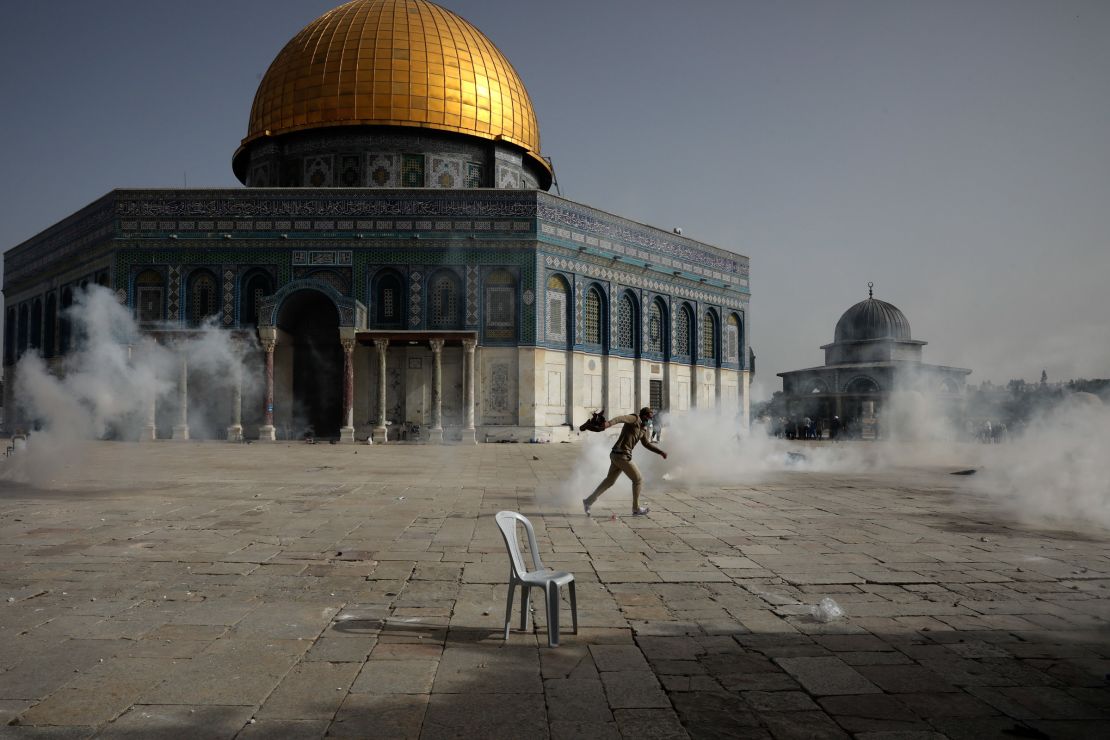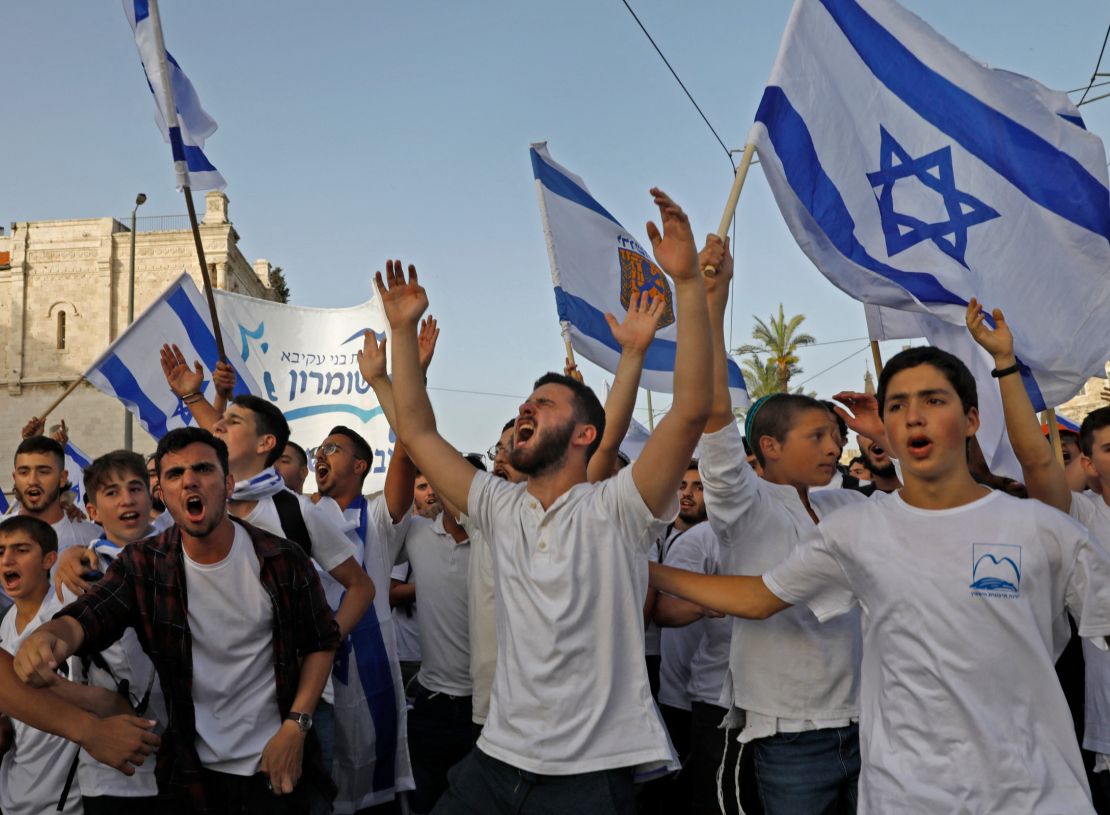Conflict between Israelis and Palestinians boiled over this week, escalating rapidly into one of the worst rounds of violence between the two sides in the last several years.
An already tense situation prompted by moves to evict Palestinian families from their homes near the Old City in Jerusalem exploded at one of the holiest sites in the city, known to Muslims as the Noble Sanctuary and to Jews as the Temple Mount.
Israeli police entered the Al Aqsa Mosque and clashed with Palestinians inside the sacred site, firing stun grenades while Palestinians threw stones.
The resulting clashes there and in other parts of the Old City left hundreds of Palestinians and some Israeli police officers injured. Palestinian militant groups in Gaza joined the fray by firing rockets into Israel, which responded with airstrikes.
A United Nations representative warned the situation was “escalating towards a full-scale war.”
Since then, hundreds more rockets have been fired by Palestinian militant groups from Gaza and Israel has stepped up its artillery and airstrike bombardment of the territory. Israel has also called up reservists, fueling fears of an imminent ground invasion in Gaza.
Meanwhile, several cities in Israel have been rocked by rioting and violent clashes between Arab and Jewish citizens.
Putting a lid on the violence may not be easy. Political, religious, and nationalist factors all play a role in the situation.
In pictures: Israelis and Palestinians endure days of violence
Why is this happening now?
The city had been on edge for several weeks, with Palestinians angered over the closure of a popular plaza just as Ramadan was beginning, and as a years-long legal battle to remove seven Palestinian families from their homes in East Jerusalem appeared set to end with eviction.
The families have been living in the Sheikh Jarrah neighborhood, just north of the Old City, since 1956 – in an arrangement brokered by the United Nations to find homes in Jordanian-controlled East Jerusalem for families who lost their property in what became the state of Israel in 1948.
An Israeli nationalist organization called Nahalat Shimon is using a 1970 law – passed after Israel gained control over East Jerusalem – to argue that the owners of the land before 1948 were Jewish families, meaning the current Palestinian occupants should be evicted and their properties given to Israeli Jews.
Palestinians contend that restitution laws in Israel are unfair because they have no legal means to reclaim the property they lost to Jewish families in the late 1940s in what became the state of Israel.
Israel’s Supreme Court was due to hear an appeal in the Sheikh Jarrah case on May 10. But Israel’s Attorney General asked for a delay.
The legal battle over the homes in Sheikh Jarrah has reignited a simmering debate about who has claim to the city, its holy sites, and its history. Jerusalem has always been the most sensitive part of the Israeli-Palestinian conflict. Small changes to a delicate situation can ignite massive protests. And extremist voices are often on hand and make themselves known.
Hundreds of Jewish extremists marched through Jerusalem at the end of April chanting “Death to Arabs,” on a night when there were a number of incidents reported of the city’s Jewish and Arab communities targeting one another for attack.
Earlier this week, the annual Jerusalem Day march, which normally works its way through the Muslim Quarter of the Old City, was re-rerouted in an attempt to avoid further escalation.
What is East Jerusalem and why is it so sensitive?
For nearly two decades after the founding of the State of Israel in 1948, the city of Jerusalem was divided. East Jerusalem was controlled by the Jordanians, while West Jerusalem was controlled by the Israelis, who made it their capital.
Crucially, the Old City of Jerusalem and its holy sites were in East Jerusalem.
The Old City is home to the Church of the Holy Sepulchre where Christians believe Jesus Christ was buried.
It is home to the Al Aqsa Mosque where Muslims believe the Prophet Mohammed journeyed on his Night Voyage, as well as the site where they believe he ascended to heaven.
And it is home to the holiest site in the world for Jews, the stone where they believe Abraham came to sacrifice his son, Isaac, and where the First and Second Temples stood in ancient times.
During the Six-Day War in 1967, Israel captured East Jerusalem, placing the entire city under Israeli control. Israel also captured the West Bank, the Golan Heights, and the Sinai Peninsula. The latter was returned to Egypt under the 1979 peace agreement, but East Jerusalem and the Golan Heights have remained under full Israeli control. The Palestinians enjoy limited autonomy in Gaza and parts of the West Bank, but Israel maintains control of all borders and security.

What is the reality in Jerusalem today?
The entire city of Jerusalem is under Israeli control. Israel says there is no difference between the city’s east and west, instead describing the city as its united capital. (Even so, the city is largely self-segregated. East Jerusalem is largely Palestinian, while West Jerusalem is largely Israeli. Israeli cab drivers often refuse to drive to locations in East Jerusalem.)
But international law considers East Jerusalem, the West Bank, the Golan Heights, and Gaza as occupied territory under United Nations Security Council Resolutions, though that characterization is disputed by Israel. United Nations Security Council Resolution 2334, passed in 2016, said that Israeli settlements in occupied Palestinian territory have “no legal validity” and constitute a flagrant violation of international law.
International law does not distinguish between settlements in the West Bank or settlements in East Jerusalem, considering them both occupied territory.
The Old City, and more specifically the Al Aqsa compound, is governed by its own agreement known as the Status Quo.
Israel is in charge of security on the site, and Jordan, through an Islamic organization called the Waqf, administers the religious sites.
In normal times, visitors of all faiths are allowed to visit the complex, but only Muslims are allowed to pray there.
Palestinians view East Jerusalem as the capital of a future Palestinian state.

What do Israel and Palestinian officials say about the Sheikh Jarrah case?
Palestinian leaders say the effort to evict families from their homes is nothing less than “ethnic cleansing” aimed at “Judaizing the holy city,” the official Palestinian news agency Wafa reported.
Israel says the conflict is simply a “real-estate dispute.” The Foreign Ministry accused the Palestinian Authority and militant groups of “presenting a real-estate dispute between private parties, as a nationalistic cause, in order to incite violence in Jerusalem.”
More than 700,000 Palestinians were displaced during the creation of the state of Israel, according to the United Nations agency supporting Palestinian refugees.
What is the international community’s position?
The effort to evict Palestinian families from the Sheikh Jarrah neighborhood has been widely criticized.
State Department spokesman Ned Price said in early May that the United States is “deeply concerned about the potential eviction of Palestinian families in Sheikh Jarrah and Silwan neighborhoods of Jerusalem, many of whom have lived in their homes for generations. As we have consistently said, it is critical to avoid steps that exacerbate tensions or take us farther away from peace. This includes evictions in East Jerusalem, settlement activity, home demolitions, and acts of terrorism.”
The European Commission also condemned the violence and expressed concern about the possible evictions. “Such actions are illegal under international humanitarian law and only serve to fuel tensions on the ground,” said Peter Stano, EU Commission lead spokesperson for Foreign Affairs and Security Policy, in a statement.
The United Nations Office of the High Commissioner for Human Rights said on May 7 that the law is “applied in an inherently discriminatory manner,” adding that the transfer of Israeli civilians onto occupied land could be “prohibited under international humanitarian law and may amount to a war crime.”
Why else have tensions escalated recently?
The Sheikh Jarrah case is the flashpoint for tensions, but they quickly spread throughout the city and far beyond the confines of Jerusalem.
The situation in Jerusalem can escalate in a hurry on its own, but the sensitivities in the city have been compounded by a combination of religious and nationalist factors.
Two holidays fell on the same weekend this year: the Muslim Night of Power (Leylet el-Qadr) on the night of May 8, considered the holiest night of the year; and the Israeli holiday of Jerusalem Day (Yom Yerushalayim) on May 9-10, celebrating the day the Israeli military took control of the Old City in 1967.
Each holiday on its own can inspire religious and nationalist fervor, and together they are even more liable to ignite an already tense situation.
The political situation has not helped. Israel has had four inconclusive elections in a row, and Prime Minister Benjamin Netanyahu has courted some openly extreme racist politicians as he struggles to build a coalition and stay in power. That has emboldened some far-right Jewish groups.
Right-wing Israeli politicians Itamar Ben-Gvir and Arieh King came to Sheikh Jarrah to send a message that the entire city belongs to Israel. Their presence fanned the flames.
The Palestinian political situation is hardly clearer than the Israeli one. Palestinian Authority President Mahmoud Abbas in April delayed the first parliamentary elections in 15 years, extending a long-running rivalry where his Fatah movement governs the West Bank, while Gaza is run by the militant Hamas, with Islamic Jihad also active there.
Such is the power of Jerusalem. Protests in Jerusalem can ignite protests in Israel and the West Bank, as well as prompt militant groups in Gaza to fire rockets and the Israel Defense Forces to launch airstrikes. A situation that began in one neighborhood in Jerusalem has now spread across the area and brought international attention to Israel and the Palestinian territories once again.

















































































